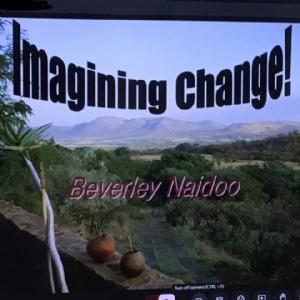Published on 18/11/24

On 17 October 2024, popular author Beverley Naidoo visited us at Stephen Perse Cambridge Junior School to talk about her important book, ‘Journey to Jo’burg’.
Beverley shared a touching photo of two black women sitting on the ground next to a young white girl on a bench. This picture helped to illustrate how people were separated by race during her childhood in apartheid South Africa, a time when unfair laws made life very difficult for many.
Beverley described her early life and how, when she came to the UK in 1965, she didn’t think of herself as a refugee at first. She explained that as a child, she was influenced by the ideas around her, observing that now we are lucky to have books that let us ask questions and wonder about our world.
During her talk, Beverley shared that ‘Journey to Jo’burg’ faced challenges when it was published. The South African government didn’t want white children to read the book because they feared it would make them ask difficult questions about fairness and race. Beverley even had copies of her book sent to her sister-in-law in South Africa, but the authorities seized them, calling them “undesirable.”
At one point, Beverley led the pupils in an engaging echo poem, which ended with the powerful line, “The words breathed freedom!” Her book was eventually unbanned in South Africa the same year Nelson Mandela was released from prison - a significant event in the country’s history.
Beverley explained how her experiences growing up led her to write more books about children facing hard situations. She researched street children for her book ‘No Turning Back’ and later wrote ‘The Other Side of Truth’ after learning about child refugees in Britain. This book won several awards, including the Carnegie Medal. When she was on her way to accept an award, she saw a news story about Damilola Taylor, a boy who sadly died in London. This inspired her to write ‘Web of Lies’, and she also wrote ‘Burn My Heart’ about violence in Kenya.
Her latest book, ‘Children of the Stone City’, is different from her earlier works. While it doesn’t take place in a specific real country, it deals with real issues that many people face today. It tells the story of a divided society where some people are seen as “allowed” and others as “not allowed.” Beverley read a part of this book to Year 6, showing how important and relevant its themes are today.
She talked about how, even though apartheid laws have changed, many people in South Africa still face difficulties. “Changing the laws is just one part; changing how people live is another,” she said, highlighting the ongoing struggles for equality.
She then went on to talk about her writing process. She mentioned that it can be messy and filled with many drafts and changes. She loves getting feedback from friends to make her stories even better. Some of her biggest inspirations include Anne Frank, whose story made her think deeply about fairness, and South African author Nadine Gordimer.
As she wrapped up her talk, Beverley expressed her hope that schools today recognize how powerful stories can be in helping children understand and care about important issues. She explains how she connects strongly with her characters, creating challenges for them but also finding ways to show hope and kindness.
Beverley Naidoo’s stories encourage us to think about fairness, empathy, and the importance of standing up for what is right. Through her writing, she inspires young readers to explore the world around them and to believe in the power of their own voices.
Two pupils, Hanna and Devin, said the talk was inspirational and showed how resilient people can be.